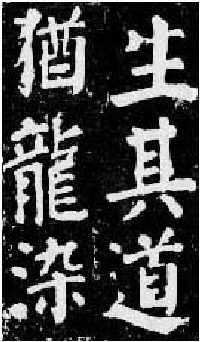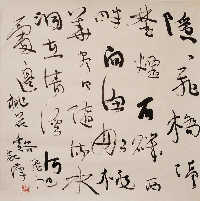 Regular Script
Regular Script
|

|
| KaishuCalligraphy by Yan Zhenqing |
Though
Kaishu(regular script) developed to a certain level in the
Jin Dynasty (265-420), calligraphic works of that period still bore traces of Lishu. The Longzang
TempleTablet and the Epitaph of the Tomb of Beautiful Lady Dong show that
Kaishuhad developed to a mature stage during the
Sui Dynasty(581-618). But it did not achieve its zenith until the
Tang Dynasty(618-907).
Kaishuis regular with a tight structure and fluent strokes. Calligraphers in the history produced many masterpieces that have been handed down. Ouyang Xun, Liu Gongquan, Yan Zhenqin and Zhao Meng developedKaishuto its peak with their unique styles, and they were called Four Masters ofKaishu.
SinceKaishuis easier to write and recognize than Lishu, it had taken the place of the latter and became a general font ever since the Wei and Jin dynasties. During the Song Dynasty, the development of typography helped create Songti - a special kind of calligraphy based onKaishu. Nowadays, calligraphy schools such as Songti, Fangsongti, Heiti and so on, which are for typeset in computer and other printed materials, are all different applications ofKaishu.
Representative: Ouyang Xun,Yan Zhenqing,Liu Gongquan
 Cursive Hand
Cursive Hand
 Caoshu(cursive hand) is characterized by sketchy, simplified forms of characters, often distorted or exaggerated to achieve an internal rhythmic appearance within the compositions of characters. In theory, any character can be written in the style ofCaoshu, for instance many characters appeared in inscriptions onbronze wares. However,Caoshuin literature refers to a specific style developed from Qin Li (official script in the Qin Dynasty), formed around the Western Han Dynasty (206BC-8AD) and prevalent in theEastern Han Dynasty(25-220).
Caoshu(cursive hand) is characterized by sketchy, simplified forms of characters, often distorted or exaggerated to achieve an internal rhythmic appearance within the compositions of characters. In theory, any character can be written in the style ofCaoshu, for instance many characters appeared in inscriptions onbronze wares. However,Caoshuin literature refers to a specific style developed from Qin Li (official script in the Qin Dynasty), formed around the Western Han Dynasty (206BC-8AD) and prevalent in theEastern Han Dynasty(25-220).
Historical records show thatCaoshucame into being in the pre-Qin period due to the fact that the fierce competition among various states made them often keep alert of any move of other states, which put a high demand on the communication
